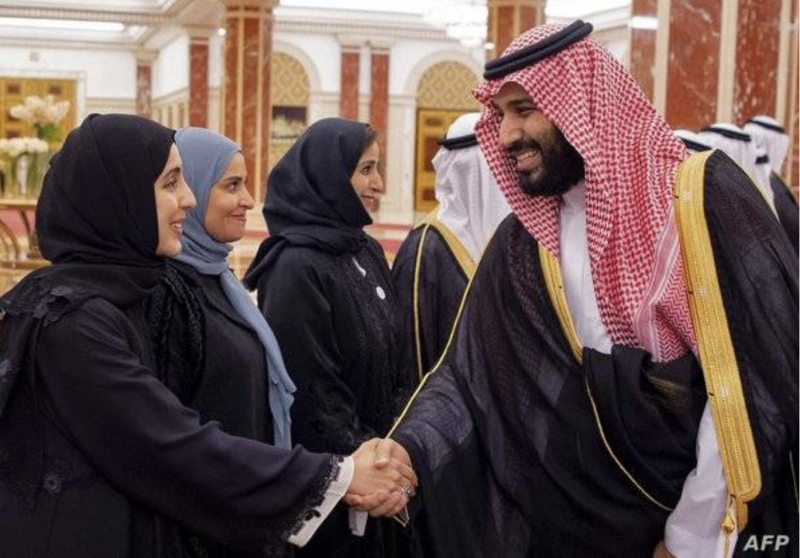
Crown Prince Mohammad bin Salman (MBS) meets Saudi women on June 6, 2018 in Jeddah. (Credit: Bandar al-Jaloud/Royal Saudi Palace/AFP)
Saudi Arabia is set to become the face of women’s rights at the United Nations. Barring unforeseen circumstances, the Gulf monarchy is set to win the chairmanship of the Commission on the Status of Women — which it joined in 2017.
Several diplomats told Human Rights Watch (HRW) that the kingdom is the only candidate for the chairmanship of this body, which is dedicated to promoting gender equality and empowerment of women, and the vote is scheduled for Mar. 22. This is an aberration for human rights organizations, which pointed to the many restrictions to which Saudi women are subjected.
“A Western diplomat at the UN told me: There has been progress in Saudi Arabia, and we want them to continue along this path, so this is an excellent opportunity for us to give them a chance, to encourage them to do better,” said Louis Charbonneau, UN director at HRW.
Saudi women’s access to freedoms has undoubtedly improved since Crown Prince Mohammed bin Salman (MBS) came to power. The change was part of a broader context of the kingdom’s modernization, under Saudi Vision 2030.
Women, who have been allowed to drive since 2018, are no longer forced to wear the veil or abaya and have seen the male guardianship’s conditions eased, as they no longer need the male guardian’s permission to obtain a passport or travel. However, they are still required to get the male guardian’s consent to get married.
An ally of the West
This is a victory for Saudi Arabia, although the decision also appears to be linked to the country’s rehabilitation on the international stage following the murder of journalist Jamal Khashoggi. Since then, Riyadh has regained its position as a key player in the region, while increasing the number of trade and strategic cooperation agreements.
“Western countries will do nothing about Saudi Arabia because it is an ally,” noted Charbonneau.
Iran was expelled from the UN Commission on the Status of Women in December 2022, following the ferocious repression of the demonstrations that were triggered by the death of student Mahsa Amini in police custody for allegedly wearing a headscarf improperly.
“This proves that there is a set of standards that are valid for certain countries, which then suddenly don’t apply to Saudi Arabia.”
Saudi Arabia’s Personal Status Law of Mar. 8, 2022, still codifies discrimination against women. “It applies to all aspects of family life, including marriage, divorce, child custody and inheritance,” says Dana Ahmed, Middle East\Gulf researcher at Amnesty International.
While the kingdom’s legislation is still largely based on the Sharia law, the Personal Status Law has codified the requirement to obtain a male guardian’s permission to get married. In addition, “Married women are required to obey their husbands in a “reasonable manner.” “A husband’s financial support is specifically contingent on a wife’s ‘obedience,’ and she can lose her right to such support if she refuses without a ‘legitimate excuse’ to have sex with him, move to or live in the marital home, or travel with him,” said an article HRW published in 2023.
“The authorities have codified repressive practices instead of trying to close the gender gap,” added the expert. She noted that the fact that it is no longer mandatory for women to wear an abaya came from a statement MBS gave to the American CBS channel in 2018, and was never set in stone.
‘Homes of care’
There are still homes of care facilities (Dar al-Reaya in Arabic) where women under the age of 30 accused of disobeying their guardians are held. “The reasons for which girls and young women are referred to Dar al-Reaya include taghayub (being absent, ‘absconding’ or running away from home), engaging in an act of ‘moral indecency,’ such as extramarital sexual relations, or uquq (disobeying a parent or male guardian),” said a report by the London-based human rights organization ALQST. The consent of the male guardian is required to leave these facilities, said ALQST.
While societal reforms have pushed women into the labor market (36 percent of the workforce by 2021) and enabled them to impose themselves to unprecedented levels in the conservative kingdom, any political expression of feminism remains severely repressed.
For instance, Manahel al-Otaibi, a 29-year-old fitness instructor, was arrested in November 2022 for posting a photo of herself on Snapchat without an abaya in a mall and for posting on social media in support of women’s rights, calling for the abolition of the male guardianship system.
Loujain al-Hathloul, the activist who called for women’s right to drive and who was imprisoned for almost four years for driving while demanding this right, is still subject to a travel ban.
According to Ahmed, hope lies in the future and first Saudi Criminal Law, the leaked 2022 version of which was recently analyzed by Amnesty International. Warning against the discriminatory elements that are reportedly there, the NGO called for the de-criminalization of intercourse outside marriage and abortion, the abolition of honor crimes, protection against marital rape and stronger protection against harassment.
“We believe that it is now very important to focus on legislative reforms because once the law has been passed by royal decree, it will be virtually impossible to amend it shortly,” said the researcher. “While the draft criminal law is still subject to legislative review by the Council of Ministers’ committee, we hope that public pressure will help to remove the most problematic provisions.”
This article was originally published in L'Orient-Le Jour. Translated by Joelle El Khoury.